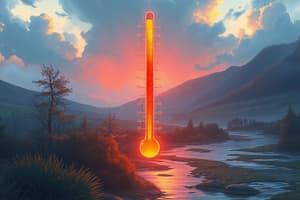Podcast
Questions and Answers
What is the unit of pressure commonly used in meteorology?
What is the unit of pressure commonly used in meteorology?
- Atmosphere (correct)
- Pascal
- Percent
- Degree Celsius
What instrument is used to measure relative humidity?
What instrument is used to measure relative humidity?
- Hygrometer (correct)
- Barometer
- Anemometer
- Thermometer
How is wind speed measured?
How is wind speed measured?
- Miles per minute
- Pascals
- Centimeters per second
- Kilometers per hour (correct)
What term describes lines on a weather map that join places having equal atmospheric pressure?
What term describes lines on a weather map that join places having equal atmospheric pressure?
What is the term for the temperature at which air becomes saturated?
What is the term for the temperature at which air becomes saturated?
Flashcards are hidden until you start studying
Study Notes
Weather and Atmospheric Concepts
- Primary parameters studied in meteorology include temperature, direction, and speed.
- Pressure is commonly measured in grams per square centimeter (gm/sq cm).
- Relative humidity indicates the moisture level in the atmosphere in relation to its maximum capacity.
- Absolute humidity measures the actual amount of water vapor present in the air.
Instruments for Measurement
- Wet and Dry Bulb Thermometer is used to measure relative humidity.
- Wind speed is quantified in kilometers per hour (km/h), miles per minute, or meters per second.
- Temperature is measured using a thermometer.
- The barometer measures atmospheric pressure, while the hygrometer measures humidity.
Atmospheric Pressure
- Standard atmospheric pressure at sea level is approximately 1013 gm/sq cm.
- Atmospheric pressure decreases with altitude, affecting weather patterns.
Temperature Concepts
- The dew point is the temperature at which the air becomes saturated with moisture.
- "Frost point" and "sleet point" are other temperature thresholds related to the state of moisture in the atmosphere.
Weather Mapping
- Lines on weather maps that connect points of equal pressure are called isobars.
- Isohyets are lines connecting locations with the same amount of precipitation.
- Isotherms join locations of equal temperature.
Meteorological Scales
- The Beaufort scale measures wind force.
- Scales can be verbal, graphic, or statement-based to convey weather information.
Influence of Pressure
- Winds flow from high-pressure areas to low-pressure areas, influencing weather patterns.
Additional Notes
- Different fields of study included in meteorology are anthropology, zoology, and seismology, although only meteorology is relevant for weather studies.
Studying That Suits You
Use AI to generate personalized quizzes and flashcards to suit your learning preferences.




